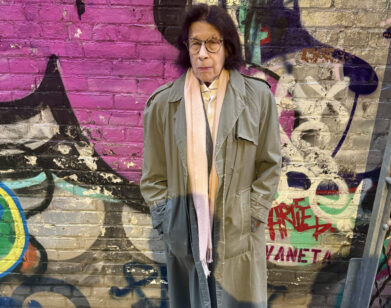IN CONVERSATION
Marianne Williamson and Matt Taibbi on Censorship, Authority, and the 2024 Election

Illustration by Claudia Buccino.
As we inch closer to one of the most crucial elections of our lifetime, we decided to team up with our friends at Substack, who over the last month have been facilitating dialogues between influential political figures, writers, and commentators. This week, we’ll publish several of those dialogues on the Interview website. The first, edited for length and clarity below, features the author and journalist Matt Taibbi in conversation with Marianne Williamson, who vied for the democratic nomination in both the 2020 and 2024 elections. Read on for their discussion about censorship, democracy, and their respective upbringings—and remember to vote!
———
MARIANNE WILLIAMSON: Hey, I’m Marianne Williamson. I’m here with one of my favorite people, Matt Taibbi. How are you doing?
MATT TAIBBI: Hi, Marianne. How are you? You’re one of my favorite people.
WILLIAMSON: Well, thank you. That means a lot to me, actually. Matt, I always feel like I’m going to come across a little too much like a fangirl, but I have to say, if you have not read Matt Taibbi’s article based on his talk at the Rescue the Republic Rally, it’s on his Substack. There’s some lines in here that are just golden. So can I just throw out some and ask you to comment?
TAIBBI: Sure.
WILLIAMSON: You said, “Our government has moved past censorship to the larger project of changing the American personality. They want a more obedient, timorous, fearful citizen. Their tool is the internet, a vast machine of doling out reward and punishment through likes and views, shaming, or de-amplification. The mechanics are complicated, but the core concept is simple: you are upranked for accepting authority, downranked for questioning it, with questions of any kind increasingly viewed as a form of disinformation.” As someone who’s in the belly of that beastly machinery, boy, I know what you mean. And then you say here, “The end game is not controlling speech. They’ve already done that. They’re doing that. The endgame is getting us to forget we have ever had anything to say.” So those are your own words.
TAIBBI: Well, I’d love to ask you about your experience with those exact issues as a candidate, but what I was thinking about [when] writing that was all the things that we’ve learned over the last two or three years about how the internet works and how our enforcement agencies look at these issues. Like the Department of Homeland security, for instance, they have something called the Building Resilience Framework, which they’ve worked on with a number of different academic entities, mostly from state schools where they already see it as a failure if a person sees an article that they think has negative political content. So what they’re trying to do is wire the brains of internet users so that they will have what they call “resilience” to bad ideas. And they do this through a variety of means. But just to take an example, Google, its search engine uses a standard of calls surfacing authoritative content. So when you do a search request, it doesn’t look for the most exact result. It looks for the result that best mixes your question and what they call “authority.” Your brain is conditioned to accept what they call the authoritative versions of things. And that’s why Wikipedia doesn’t allow Substack sites, for instance. All throughout the internet, you learn to avoid certain kinds of material and to accept others. And the last thing I’ll point out is they are constantly monitoring who you retweet, which sites you access, which feeds you look at, and you will be downranked and de-amplified just for looking. This also becomes part of your psyche, but I’m sure you’re familiar with all this, having been in politics. You must’ve had an incredibly difficult time trying to get a wide audience for precisely these reasons.
WILLIAMSON: Well, it’s like you said, they use shaming and de-amplification and they give you more exposure if you’re a good girl, and they de-amplify you if you’re not. It says here in your article, “To the people who are suggesting that there are voices who should be ignored because they’re encouraging mistrust or skepticism of authority or obstructing consensus, I’m not encouraging you to be skeptical of authority. I’m encouraging you to defy authority.” That is the right word for this time.
TAIBBI: Right.
WILLIAMSON: What I love about your article and what you’re pointing out is not just the mechanics, not just how they’re doing it, but what it’s doing to our minds and what it’s doing to our personalities. One of the things that I felt when I was running, which was just extraordinary to me, were intelligent people who were saying ridiculous narratives like, “We don’t primary an incumbent president.” Well, I’m old enough to remember when Eugene McCarthy and Bobby Kennedy Sr. primaried Lyndon Johnson, and Ted Kennedy was going to primary Jimmy Carter. It’s a change in the American personality. I want to hear you talk about that, because the way you describe the censorship class, we don’t have working-class sensors. None of the hungry are censoring, none of the poor are censoring. Who are these people that we’re allowing to eat our brains?
TAIBBI: I think that’s the hidden scandal of the whole content moderation thing. For instance, Europe has this new law called the Digital Services Act, which is a terrifying new Draconian law, which essentially forces all of the platforms to abide by the recommendations of these hidden content monitors who have the name “Trusted flaggers.” Now, in order to be a trusted flagger, you have to basically be registered with the state, which has to review your credentials. It’s just sort of rampant credentialism. These people are all highly educated, they’re all appointed by various political committees. They’ve gone through the same academic institutions. You had to have a master’s degree to do anything substantive, and you had to have a bachelor’s just to do the maintenance work for content moderation, like preparing content for people to look at. So there are no people who are working class, who are struggling and have three jobs, who do this kind of stuff. The people who tend to do this kind of work seem to be the most intellectually uninterested people in the world. And I’m sure that’s your experience, too.
WILLIAMSON: Well, they’re the protectors of the system. And what I saw, and of course as a woman, I felt it so strongly because women who don’t toe the line, they’re “crazy.” Our creativity is going into feeding the machine rather than, as you said, defying the machine. When I grew up, my father used to walk around the house saying, “Beat the system, kids.” We were taught to be suspicious of authority.
TAIBBI: Right, yeah. Remember the bumper stickers: “Question authority?” That was the big trope in the 70s, right?
WILLIAMSON: One of the things I’ve noticed in this election cycle is how quiet some of the most rambunctious, creative, rebellious voices in Hollywood have been. Everybody’s so afraid of being canceled. They’ll boycott the movie. You won’t get a job. It is a form of witch-burning. Now I know that in my case, whatever has preserved any sense of “hell no” in me has to do with the way I was raised, has to do with my childhood. What about you?
TAIBBI: Certainly, it’s part of the way I was raised. I mean, my father was a reporter, so I grew up in newsrooms. And newsrooms are like comedy clubs; everything’s fair game. But I was a big fan of all of those satirical novels. Everything from Catch-22 to 1984, Brave New World, Franz Kafka novels. I think people need to understand that there are eternal themes that they have to pay attention to.
WILLIAMSON: Remember that Eugène Ionesco play, The Rhinoceros? Did you read that when you were a kid?
TAIBBI: No, I didn’t.
WILLIAMSON: It was a metaphor for Nazi Germany and how people just turned into rhinoceroses. But if we want to really dismantle what’s going on here, didn’t a lot of this start with the Telecommunications Act of 1996?
TAIBBI: Yeah, I guess so. I think that’s probably when the government first started realizing that the internet was something that they were going to have to contend with eventually. But my understanding is that they didn’t start thinking about domestic censorship the way that they do now until after the Arab Spring, Brexit, and Trump’s election. Because up until then, the internet was seen as this democratizing force.
WILLIAMSON: I wasn’t even thinking of the internet. I was talking about the conglomeratization of even mainstream media. I mean, when I was a kid, my father told us how the same company was not allowed to own the radio station and the television station and the newspaper because it was codified into law and understood by the American mind how important the diversification of information was. You couldn’t even take the same elevator to news as to sales, right?
TAIBBI: That’s totally true. I mean, all those stories about how the salespeople weren’t allowed to mix with the editorial people—the New Yorker famously had a policy about that, if I remember correctly. But sometime in the early 2000s, the rules not only started relaxing, but you would start to see the salespeople in with the news directors, having meetings with them about their overall strategy.
WILLIAMSON: Yeah, it’s a political media industrial complex. And those of us who have been aware for a long time that Fox is so often a mouthpiece of the Republican Party really need to wake up if you think MSNBC isn’t also a mouthpiece of the Democratic Party. Somebody was saying this awful thing about me the other day on TikTok. So I got on there and I said, “These are lies.” And one woman said, “Well, why would she lie?” And I said, “Are you new around here?” And at a certain point when we ask what really makes us resilient? It’s ethics.
TAIBBI: I would welcome a return to ethics, but it seems like a foreign concept now because everything is subordinate to this other urge. In your case, they went hunting for the tiniest little things to try to build you into a villain and also to create this argument that just your mere presence, that you would even think to run [for President] was so objectionable. This is so counter to what democracy is all about. And yet people go for this. I don’t understand where that comes from.
WILLIAMSON: The idea there, of course, was that we have to save democracy from the assault by Donald Trump. Listen to whoever’s running and trust the people—that’s what the founders said. They didn’t think it was going to work one hundred percent of the time. They weren’t stupid. But they thought that, as Jefferson said, the only safe repository for power is in the hands of the people. Let the people decide. We would’ve had a year-and-a-half of robust conversation about where America should go in the next four years. But it’s not just about me; it’s about anybody who was running. The majority of Republicans as well as Democrats want universal healthcare, tuition-free college, et cetera. And I think it’s kind of worse and more nefarious even than you said. On the part of some of those people, they would rather see Trump win than let somebody in here that has not come through us. In the constitution, what’s so brilliant is that it doesn’t say that the person who’s president had to have been a lawyer or a governor or a senator or a congressman. They were protecting against that kind of political class domination and ownership. Am I wrong about that?
TAIBBI: When I was preparing for that Rescue the Republic speech, it had been a while since I had read some of those texts. I hadn’t read the Federalist papers for 20 years. And you forget that the overriding concern of the original founders was this worry about creating a tyrannical system of government and doing whatever they could to prevent concentration of power so that people would always have power over the government. I mean, one of the things that [James] Madison said that I thought was so brilliant is that the censorial power is of the people over the government, not the other way around, right?
WILLIAMSON: Exactly.
TAIBBI: You get to throw the bums out. That’s the way democracy works. They don’t get to do it to you, though.
WILLIAMSON: Some of the people whose minds have been trained to be so acquiescent go to the best schools, they’re the people who should be the most rambunctious. But the system has sucked them in: “You be good and you can stay here. You be good, and you can have this high-level job. You be good, and you can make good money. If you deviate at all, we’re coming after you.” We’ve had a corporate coup in this country. Insurance companies, pharmaceutical companies, big food, big chemical, big agricultural, gun manufacturers, big oil, and defense contractors—their profits supersede your safety, health, and wellbeing. Their profit margins supersede humanitarian and democratic values. Shouldn’t people know that that’s an option?
TAIBBI: They should. But the problem is when you turn on pop culture or the news, what do you see? You see one defense contractor after another. In the run-up to the Iraq war, I think the group Fairness and Accuracy in Reporting did a study where they counted how many anti-war critics had been on [television] versus how many ex-military officials, and it was some ridiculous thing like, 263 to 1. People are only seeing one point of view.
WILLIAMSON: And the advertising.
TAIBBI: It’s all of a piece.
WILLIAMSON: I remember when Trump brought in H.R. McMaster as his National Security Advisor. And I thought, “Oh no, that is supposed to be a civilian. It shouldn’t be a general.” And he changed that. And I thought, “That’s not cool.” But then when Biden came in, his general used to be a board member at Raytheon.
TAIBBI: Exactly.
WILLIAMSON: What blew my mind was there was nobody saying, “Hey, this isn’t supposed to happen.” The things that people are not upset by are scarier to me than the things that people are upset by.
TAIBBI: What’s so interesting to me is when we were coming up through school, the cool book to read was Howard Zinn’s A People’s History of the United States. The kids go to school now, and they all can read that stuff, but they don’t read about how the American system was supposed to work, the good aspects of it which were designed to prevent exactly what you’re talking about, like the over-concentration of power in the military. They were very suspicious of standing armies. There were good ideas in the American system about preventing exactly the kind of tyranny that even Howard Zinn opposed, right? And we’re oblivious to those things now.
WILLIAMSON: What I got from running twice is that the American people are not the problem here. When you’re actually in a room full of people, their phones are not on. We’re just talking amongst ourselves. I saw such decency. And I always remind people, this is a country that elected Lincoln twice. And my experience was that when you speak nobly to people, when you present and submit a noble idea, there’s a noble listening in this country.
TAIBBI: I saw it in your speeches. If you’re straight with people, if you don’t talk down to them, if you treat them like adults and you admit them as qualified partners in the enterprise of running for office, they love that. They respond to that.
WILLIAMSON: I saw it, too.
TAIBBI: Right? And what’s so frustrating about this recent era is that we’ve raised this new kind of politician that does exactly the opposite. They’re always trying to project a point of view on people, and they’re totally out of touch with what is going on in people’s lives because all they’re getting is data from pollsters. I mean, as I’m sure you know, that’s not the way to find out what’s happening.
WILLIAMSON: And people hear you on the level that you speak to them from. So if you’re only speaking to people’s self-interest, then they’re only speaking back from self-interest. But if you speak to them about a higher, more noble possibility in this country, we’re hardwired in this country to want to do great things. And I think that there is a sense in this country on the right as well as the left that a great, fundamental course-correction is necessary.
TAIBBI: I hope so.






